If you want to keep your wine collection perfectly chilled, consider the SC PRO 2000 for smaller spaces or the SC PRO 3000 for larger ones. The Slimline LS offers customizable airflow, while the Allavino ACU 4000 is great for extensive collections. For a compact option, check out the Platinum Mini Split. Each unit has unique features tailored to different needs, including energy efficiency and noise considerations. By understanding your cellar's requirements, you'll find the best fit. Explore your options further and discover which system can truly enhance your wine preservation strategy.
SC PRO 2000 Wine Cooling Unit
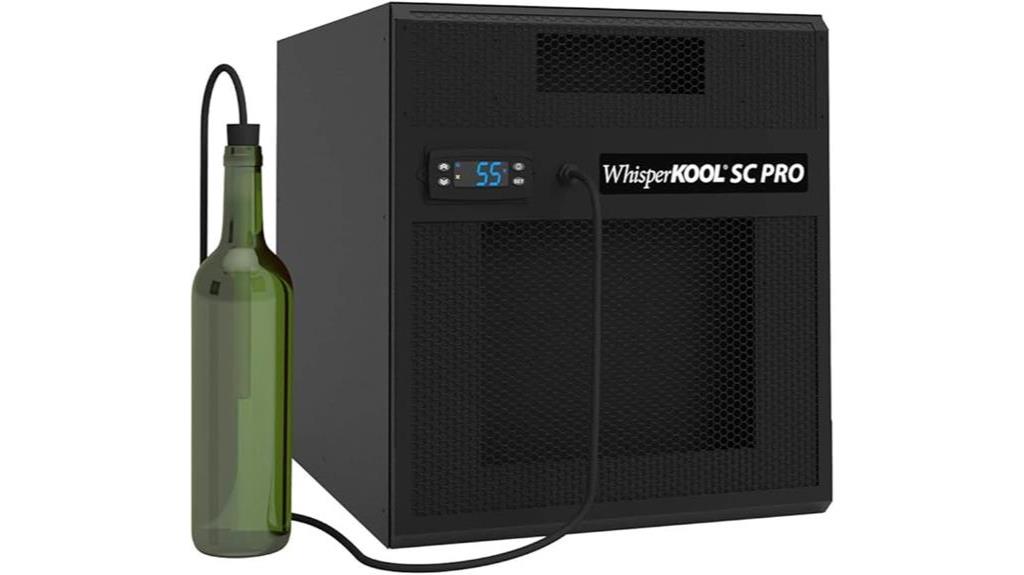
The SC PRO 2000 Wine Cooling Unit is an excellent choice for wine enthusiasts who prioritize precise temperature control. With a capacity of up to 300 cu. ft., it's perfect for properly insulated cellars. I appreciate its digital thermostat and advanced airflow technology, which help maintain that ideal 55°F for wine storage. Installation is a breeze since it matches the dimensions of earlier WhisperKool models. However, I've noticed mixed reviews regarding its longevity—some users report it lasts only a couple of years, while others enjoy its quiet operation and effective temperature management. If you're considering this unit, be mindful of potential durability issues and the mixed customer support experiences. Overall, it's a solid option for keeping your collection perfectly chilled.
Best For: Wine enthusiasts seeking precise temperature control in a properly insulated cellar.
Pros:
- Digital thermostat allows for accurate temperature regulation at 55°F.
- Easy installation due to matching dimensions with previous WhisperKool models.
- Quiet operation ensures minimal disturbance while maintaining optimal conditions.
Cons:
- Mixed reviews regarding longevity, with some users experiencing failures within 1-2 years.
- Customer support issues reported, making repairs and assistance challenging.
- Durability concerns expressed by users comparing it to older models that lasted much longer.
SC PRO 3000 Wine Cooling Unit
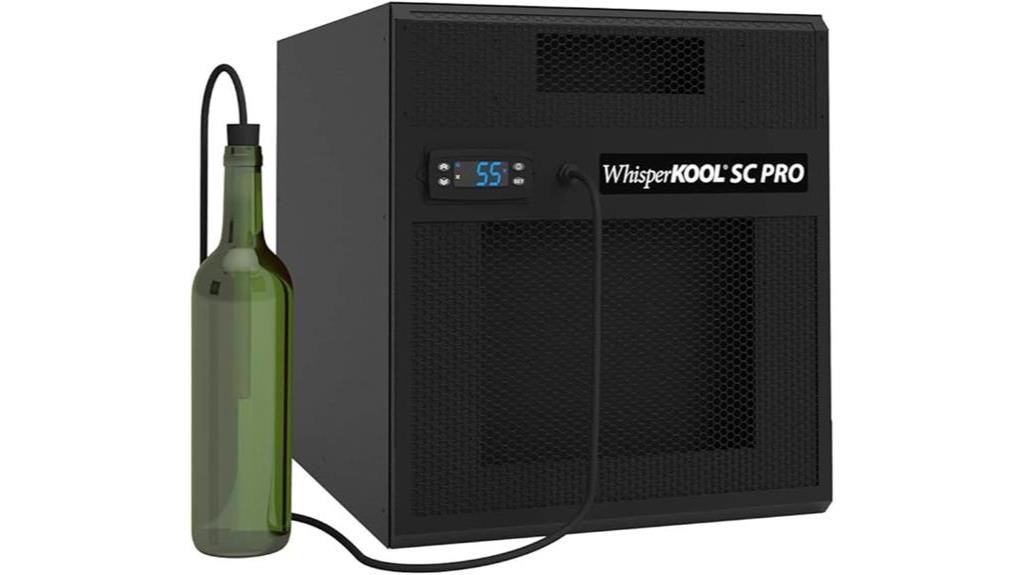
For those seeking a reliable solution to maintain ideal wine storage conditions, the SC PRO 3000 Wine Cooling Unit stands out with its advanced airflow technology and whisper-quiet operation. With dimensions of 17.5L x 14.25W x 15.75H, it can handle spaces up to 650 cu. ft., but proper insulation is essential. The front-mounted digital thermostat allows for easy temperature adjustments, while the effective condensate management system guarantees longevity. However, I've noticed some concerns among users, including loud vibrations and overheating issues, with reports of failures within 2-3 years. Plus, customer service could use improvement. Despite these drawbacks, its competitive pricing and 30-day return guarantee make the SC PRO 3000 a compelling option for wine enthusiasts.
Best For: Wine enthusiasts looking for an effective cooling solution for their wine cellars or storage spaces.
Pros:
- Whisper-quiet operation ensures minimal noise disruption.
- Advanced airflow technology provides optimal temperature regulation.
- 30-day return guarantee offers peace of mind for buyers.
Cons:
- Reports of loud vibrations and overheating issues from users.
- Some units have experienced failures within 2-3 years of use.
- Customer service and warranty claims have received negative feedback.
Slimline LS Wine Cellar Cooling Unit (Standard)
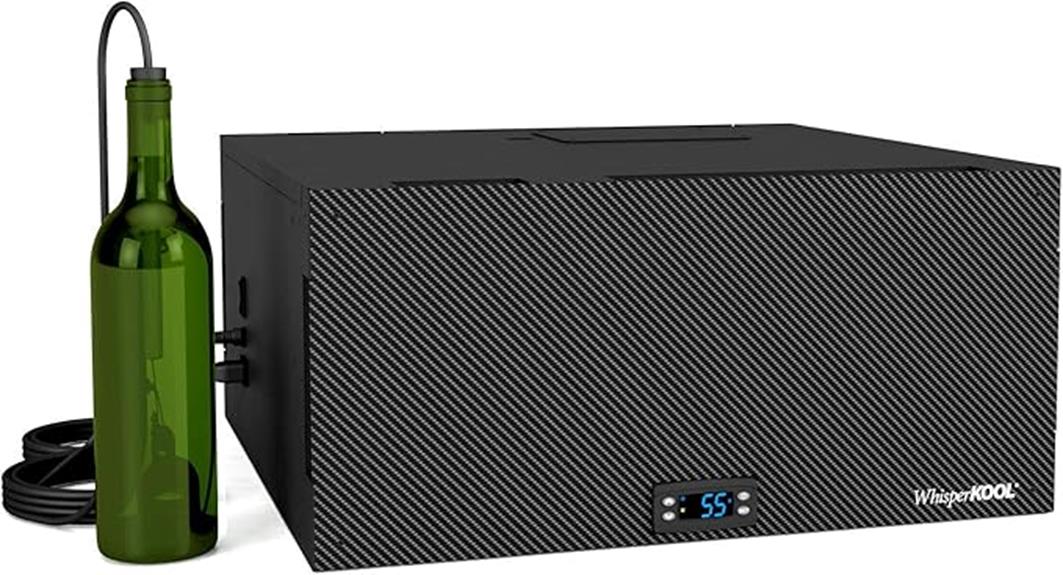
When looking for an efficient solution to maintain ideal wine storage conditions, the Slimline LS Wine Cellar Cooling Unit (Standard) stands out with its impressive cooling capacity. It can handle spaces up to 650 cubic feet on low fan speed and 1,000 cubic feet on medium, given proper insulation. The unit features a digital thermostat for precise temperature control and a two-speed fan switch for customizable airflow. I appreciate its quieter operation due to centrifugal blowers and coated evaporator coils that enhance efficiency. However, I've noticed mixed customer feedback, with some reporting noise and performance issues. Before purchasing, I'd recommend consulting a cellar professional and performing heat load calculations to ascertain it's the right fit for your wine collection.
Best For: Wine enthusiasts and collectors looking for an efficient cooling solution for medium-sized wine cellars.
Pros:
- Digital thermostat for precise temperature control.
- Two-speed fan switch allows for customizable airflow based on needs.
- Quieter operation due to centrifugal blowers, enhancing the overall user experience.
Cons:
- Mixed customer feedback regarding noise and performance issues.
- Reports of unit failure within 2 years, raising concerns about reliability.
- Potential warranty issues that may complicate customer support experiences.
Allavino ACU 4000 Wine Cellar Cooling Unit
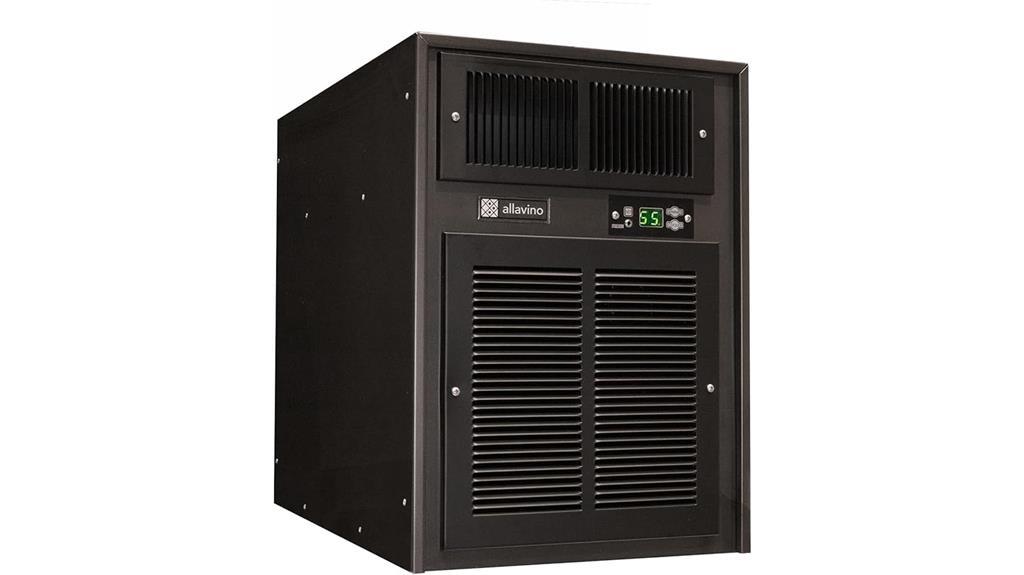
Looking for a reliable cooling solution for your wine collection? The Allavino ACU 4000 Wine Cellar Cooling Unit might be just what you need. With a capacity of 1,000 cubic feet, this compact, self-contained unit features a stylish antique bronze finish that enhances any cellar. It boasts an advanced cooling system, complete with the Sentry III control system for precise temperature management. The continuous LED digital display keeps you informed, while a blocked airflow protection feature guarantees peak performance. The unit is ready to go once mounted in a wall and connects easily to a standard 115 AC volt source. Weighing 77.8 pounds, it's a solid choice for serious wine enthusiasts.
Best For: Wine enthusiasts looking for a reliable and stylish cooling solution for their wine cellar.
Pros:
- Advanced cooling system ensures precise temperature management for optimal wine storage.
- Compact design allows for easy installation and integration into various cellar spaces.
- Antique bronze finish adds an aesthetically pleasing touch to your wine cellar.
Cons:
- Limited capacity of 1,000 cubic feet may not suffice for larger wine collections.
- Requires wall mounting and connection to a specific electrical source for operation.
- Relatively heavy at 77.8 pounds, which may complicate installation for some users.
Platinum Mini Split Wine Cellar Cooling Unit
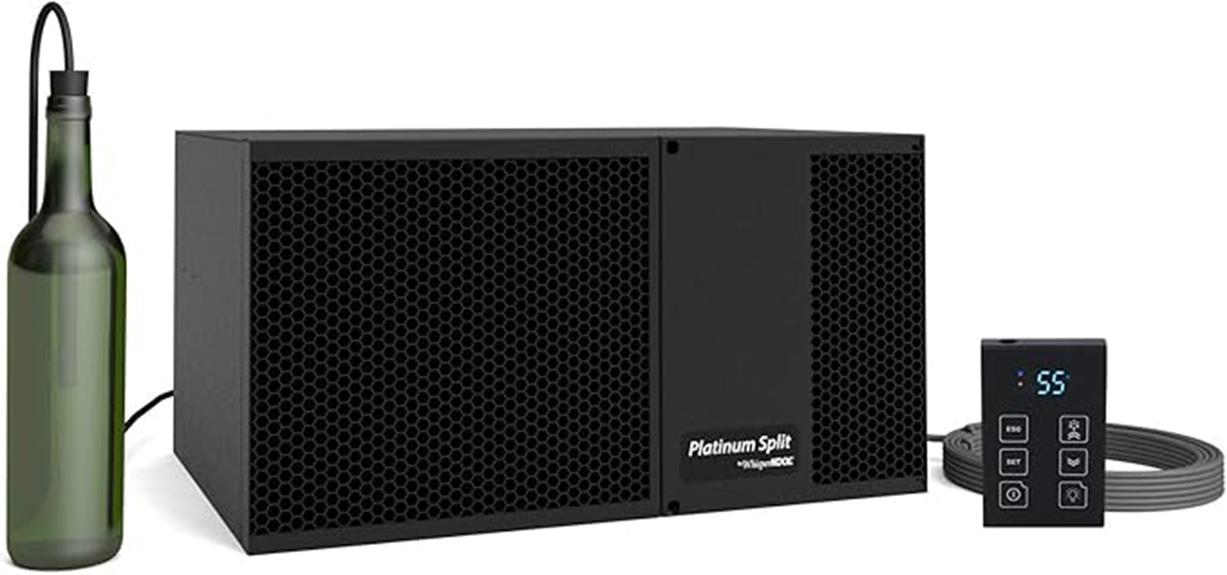
The Platinum Mini Split Wine Cellar Cooling Unit stands out with its KDT Plus Digital Touch Display, offering precise temperature control for avid wine collectors. I love that it can handle up to 500 cu. ft. when fully insulated, making it suitable for serious collectors. However, I've noticed mixed reviews; some users praise its reliability, while others report issues with defective parts and poor customer service. Installation is essential—if you don't hire a qualified HVAC-R technician, your warranty might be voided. Honestly, the warranty coverage is limited, only covering $250 for service, which isn't much considering repair costs. If you're considering this unit, weigh the pros and cons carefully; alternative brands might offer better reliability and service.
Best For: Avid wine collectors looking for a reliable cooling solution for wine cellars up to 500 cu. ft.
Pros:
- Effective cooling performance when functioning properly.
- KDT Plus Digital Touch Display allows for precise temperature control.
- Compact design fits well in various wine cellar configurations.
Cons:
- Mixed customer experiences with defective parts and reliability issues.
- Limited warranty coverage, only covering $250 for service costs.
- Installation by a qualified technician is mandatory to avoid warranty voidance.
Factors to Consider When Choosing Wine Cellar Cooling Systems
When choosing a wine cellar cooling system, you need to evaluate several important factors. Think about the cooling capacity requirements, installation complexity, and noise level, as these can impact your experience. Additionally, energy efficiency ratings and temperature control precision are vital for maintaining the ideal environment for your wine collection.
Cooling Capacity Requirements
Choosing the right cooling capacity for your wine cellar is essential for maintaining ideal storage conditions. To start, you need to match the cooling capacity of your unit to the size of your cellar. Smaller units typically handle around 300 cu. ft., while larger systems can cool spaces up to 1000 cu. ft.
Before selecting a cooling unit, perform heat load calculations. This step helps you consider factors like your cellar's size, insulation quality, and exposure to external temperatures. Proper insulation and a vapor barrier are critical, as they reduce heat load and help maintain your desired temperature.
Remember that cooling units can vary in capacity based on their operational settings; for example, some units can effectively cool 650 cu. ft. at low fan speed and up to 1000 cu. ft. at medium fan speed. Additionally, look for units with advanced airflow technology and effective condensate management systems. These features enhance cooling efficiency and prolong the life of your cooling system, ensuring better temperature control for your prized wine collection.
Installation Complexity
Selecting the right wine cellar cooling system involves more than just cooling capacity; installation complexity plays a notable role too. Different types of cooling units have varying installation demands. For instance, wall-mounted units usually offer a simpler install compared to systems that require ductwork or specialized configurations, which can complicate matters considerably.
You'll also need to take into account specific installation requirements like proper insulation and vapor barriers. These elements are vital for guaranteeing peak performance. Additionally, check that your installation space accommodates the dimensions of the cooling unit, as well as proper airflow and maintenance access. Failure to meet these requirements can lead to inefficiencies.
If you feel overwhelmed, consulting a cellar professional can simplify the process. They can perform heat load calculations and recommend the best design, ultimately enhancing the cooling unit's efficiency. Remember, improper installation can void warranties, so it's often wise to involve a professional HVAC-R technician for more complex systems. By addressing these installation complexities early on, you can guarantee your wine cellar remains the ideal environment for your collection.
Noise Level Considerations
Considering noise levels is essential when evaluating wine cellar cooling systems, as these units can significantly vary in sound output. Some models are designed for quiet operation, utilizing advanced airflow technology and centrifugal blowers to minimize noise, while others may produce loud vibrations that disrupt the ambiance of your cellar.
When choosing a cooling system, pay close attention to noise ratings and customer reviews. Many users report noise complaints, noting that certain systems create disruptive sounds, especially if the unit is installed in a living area or near entertainment spaces. You don't want your wine cellar to be a source of annoyance.
Also, remember that installation plays a vital role in noise levels. Professional installation can help mitigate operational noises through proper mounting and placement, ensuring that your unit runs as quietly as possible. By considering these factors, you can select a cooling system that not only keeps your wine at the perfect temperature but also maintains a peaceful environment in your home. Taking the time to assess noise levels will enhance your overall experience, allowing you to enjoy your wine collection without any unwanted disturbances.
Energy Efficiency Ratings
When it comes to wine cellar cooling systems, energy efficiency ratings play an essential role in your decision-making process, as they directly impact both your utility bills and the environment. Look for units with a high Seasonal Energy Efficiency Ratio (SEER) or Energy Efficiency Ratio (EER). These ratings indicate the cooling output relative to energy consumption, meaning you'll save money over time.
A digital thermostat can also enhance energy efficiency by allowing for precise temperature control, reducing unnecessary energy use. Additionally, focus on the insulation of your wine cellar. Proper insulation and vapor barriers can greatly improve energy efficiency by minimizing heat intrusion, allowing your cooling unit to operate more effectively.
Don't forget about maintenance, either. Regular checks on your cooling unit—like cleaning coils and ensuring unblocked airflow—can optimize performance and further reduce energy consumption. By considering these factors, you can choose a wine cellar cooling system that not only keeps your collection perfectly chilled but also helps you save on energy costs while being kinder to the planet.
Temperature Control Precision
Precision in temperature control is imperative for preserving the quality of your wine collection. To maintain ideal conditions, aim for a stable temperature around 55°F. Advanced cooling systems often come equipped with digital thermostats, enabling you to make accurate adjustments and monitor temperatures easily through LED displays. This technology guarantees you can keep a close eye on your wine's environment.
Effective condensate management systems are also essential, as they help prevent excess moisture that can cause temperature fluctuations. When choosing a cooling unit, consider its capacity relative to the size of your cellar. It's crucial that the unit can maintain consistent temperatures, even under varying load conditions.
Additionally, proper insulation and sealing of your wine cellar play a significant role in temperature control. Good insulation minimizes external temperature influences, while effective sealing prevents air leaks, ensuring your cooling system works efficiently. By paying attention to these factors, you can create an optimal environment for your wine collection, allowing it to age gracefully and maintain its integrity over time.
Warranty and Support Options
Warranty and support options are essential factors to evaluate before investing in a wine cellar cooling system. Start by looking at the warranty duration and coverage details, as many units only offer a limited warranty of 24 months. You want protection that extends beyond that, especially for such a significant investment.
Next, consider the quality of customer support. Many users report challenges in getting help for repairs and warranty claims, which can lead to frustration down the line. Make sure you're choosing a brand known for responsive and helpful customer service.
Don't forget to review the return policy. Some retailers offer a 30-Day Return Guarantee, allowing you to return the unit if it doesn't meet your expectations. This can provide peace of mind during your purchase.
Also, investigate common issues reported by users regarding warranty claims and service accessibility. Some systems may have reputations for poor customer service, which can complicate your experience. Finally, remember warranty activation requirements; certain installations might need professional setup to maintain warranty validity, adding another layer of complexity when it comes to repairs and support.
Frequently Asked Questions
How Do I Maintain My Wine Cellar Cooling System?
To maintain your wine cellar cooling system, start by regularly checking the temperature and humidity levels. Clean the unit's filters every few months to guarantee proper airflow. Inspect the condenser coils for dust buildup and clean them as needed. Don't forget to check for leaks or unusual noises, as these can indicate problems. Finally, schedule professional maintenance at least once a year to keep everything running smoothly and protect your wine collection.
Can I Install a Cooling Unit Myself?
Did you know that nearly 30% of wine enthusiasts prefer DIY installations for their cooling units? If you've got some handy skills, you can definitely install a cooling unit yourself. Just guarantee to follow the manufacturer's guidelines closely and have the right tools on hand. However, if you're not confident in your abilities, it might be worth hiring a professional to confirm it's set up correctly and efficiently.
What Temperature Is Ideal for Wine Storage?
The ideal temperature for wine storage is between 45°F to 65°F (7°C to 18°C), depending on the type of wine. Red wines typically do best at around 55°F (13°C), while white wines prefer slightly cooler temperatures, around 50°F (10°C). You want to avoid fluctuations, so maintaining a consistent environment is key. Keeping your wine at the right temperature helps preserve its flavor and aroma, ensuring you enjoy each bottle at its best.
How Noisy Are These Cooling Systems?
Imagine your wine collection as a peaceful garden, thriving under the right conditions. If you're considering a cooling system, noise levels can be a concern. Some units hum like a gentle breeze, while others might roar like a summer storm. You'll want one that maintains your serene atmosphere, ensuring your wine's flavor isn't disturbed. So, check the specifications, read reviews, and find a system that keeps your collection cool without disrupting your oasis.
Do I Need a Backup Power Supply for the Cooling Unit?
Yes, you should consider a backup power supply for your cooling unit. If there's a power outage, your wine collection could be at risk without proper temperature control. A backup system can kick in to maintain the ideal environment for your bottles, ensuring they age gracefully. You'll appreciate the peace of mind knowing your collection is safe, even during unexpected power interruptions. Investing in a reliable power supply is a smart choice for any wine enthusiast.
Wrapping Up
In choosing the right wine cellar cooling system, it's essential to take into account your collection's size and the specific environment. Did you know that maintaining a consistent temperature between 50°F and 57°F can enhance the aging process of wine? With the options we've explored, like the SC PRO units and Allavino ACU, you can find a perfect fit for your needs. Keep your wines perfectly chilled, and you'll guarantee they age gracefully for years to come!

Hi, I’m Charlie, and I cover all things laundry here at Appliance Mastery.
I’ve spent over eight years working on washing machines, dryers, and dishwashers. I also have a degree in mechanical engineering, which helps me understand how these appliances really work.
I try to make every guide clear and practical. If you’re stuck with a noisy dryer or a leaking washer, I’ll help you figure out what’s wrong and how to fix it.
